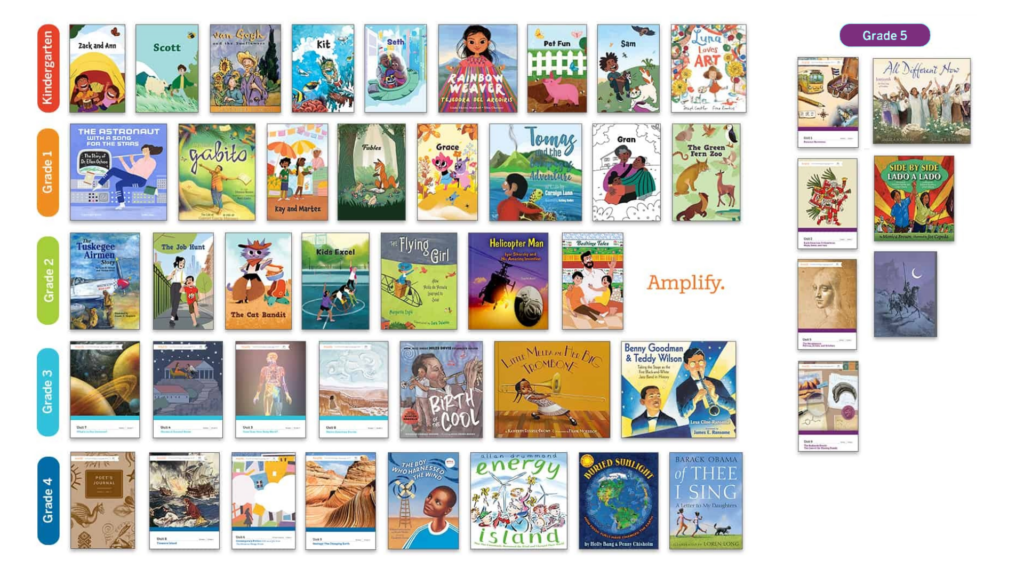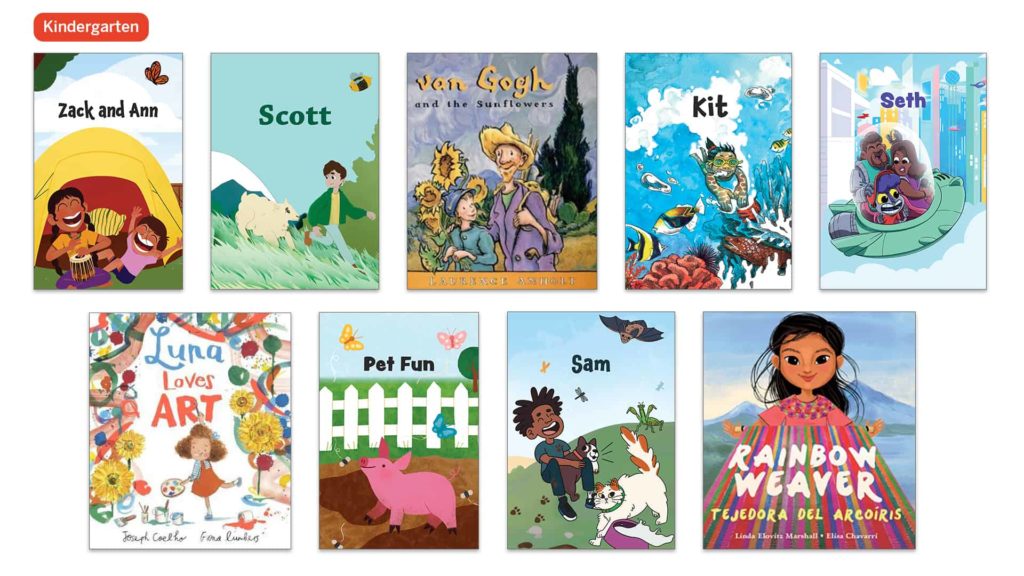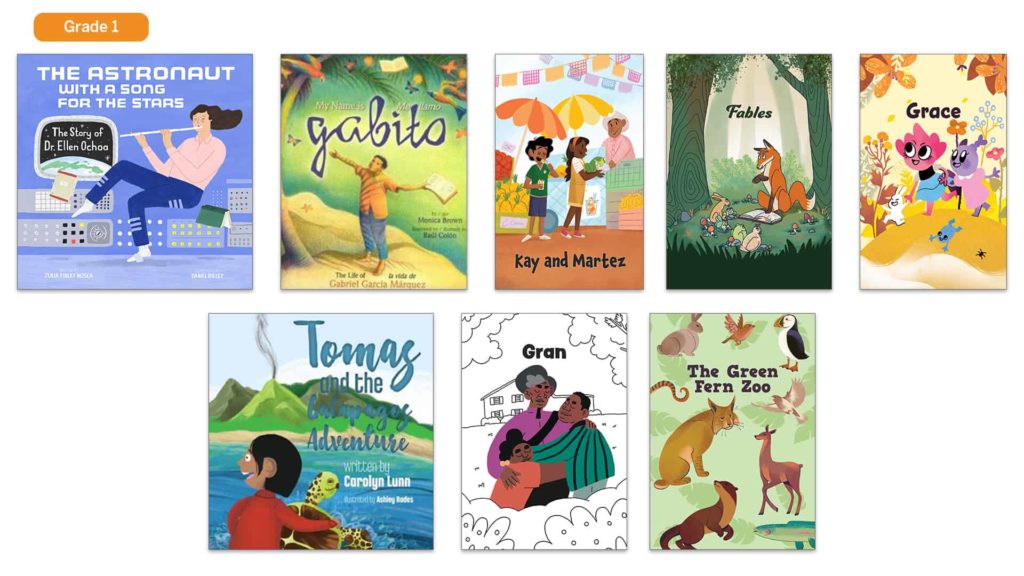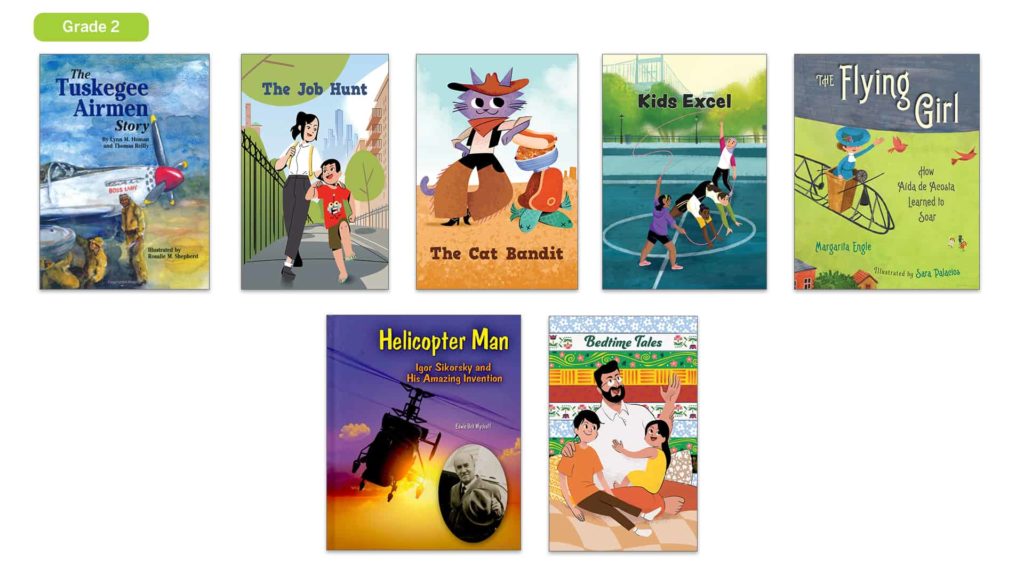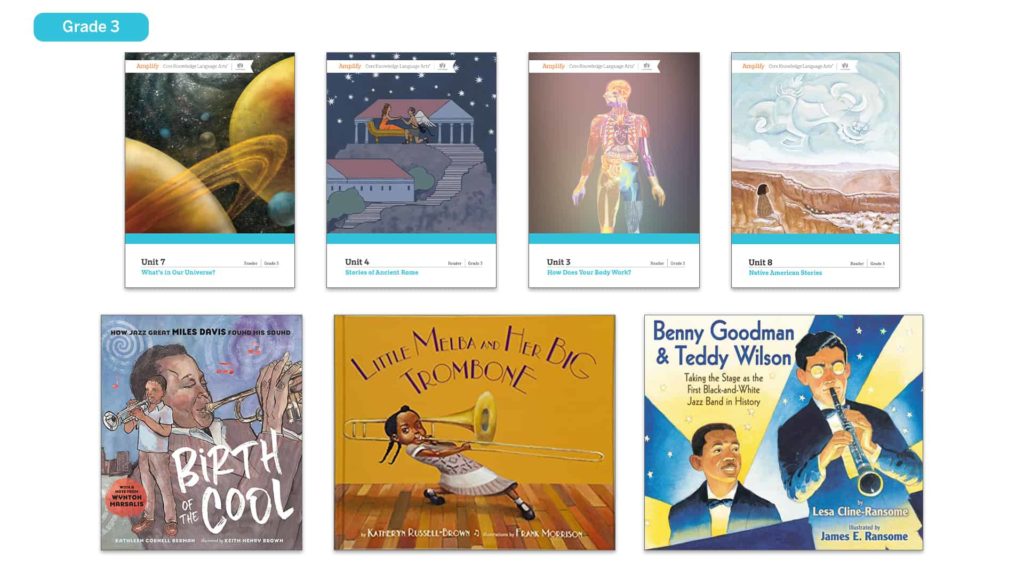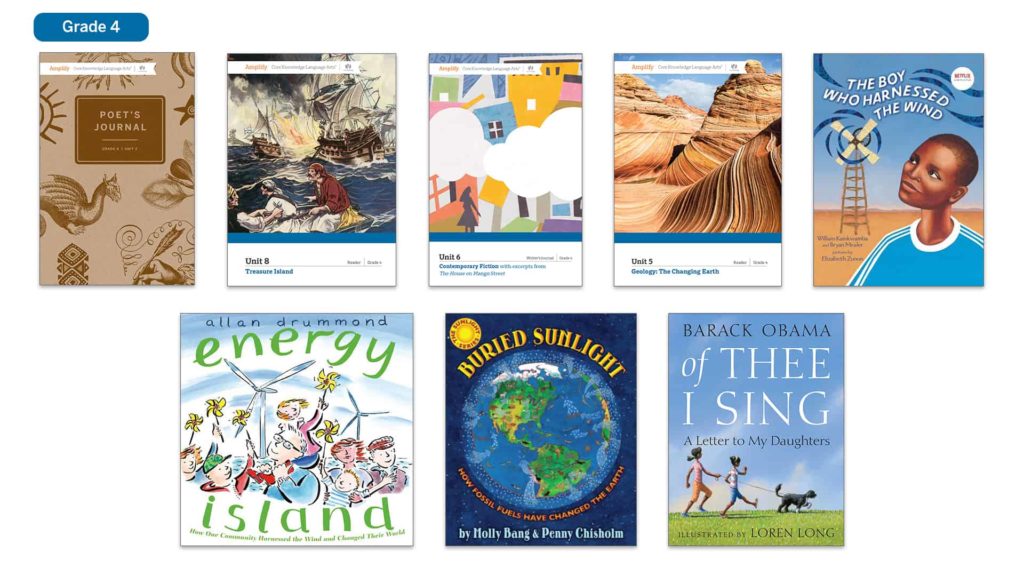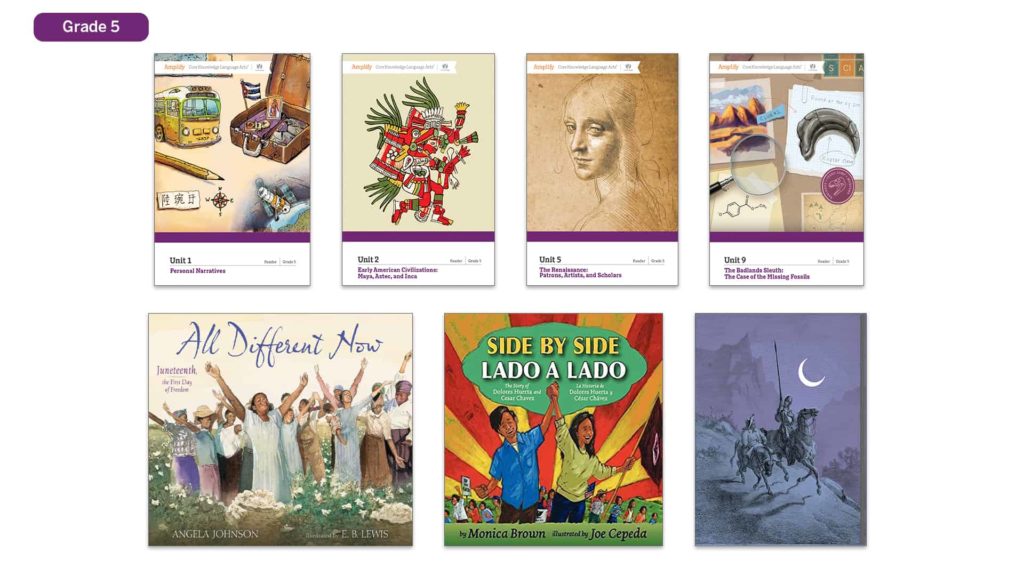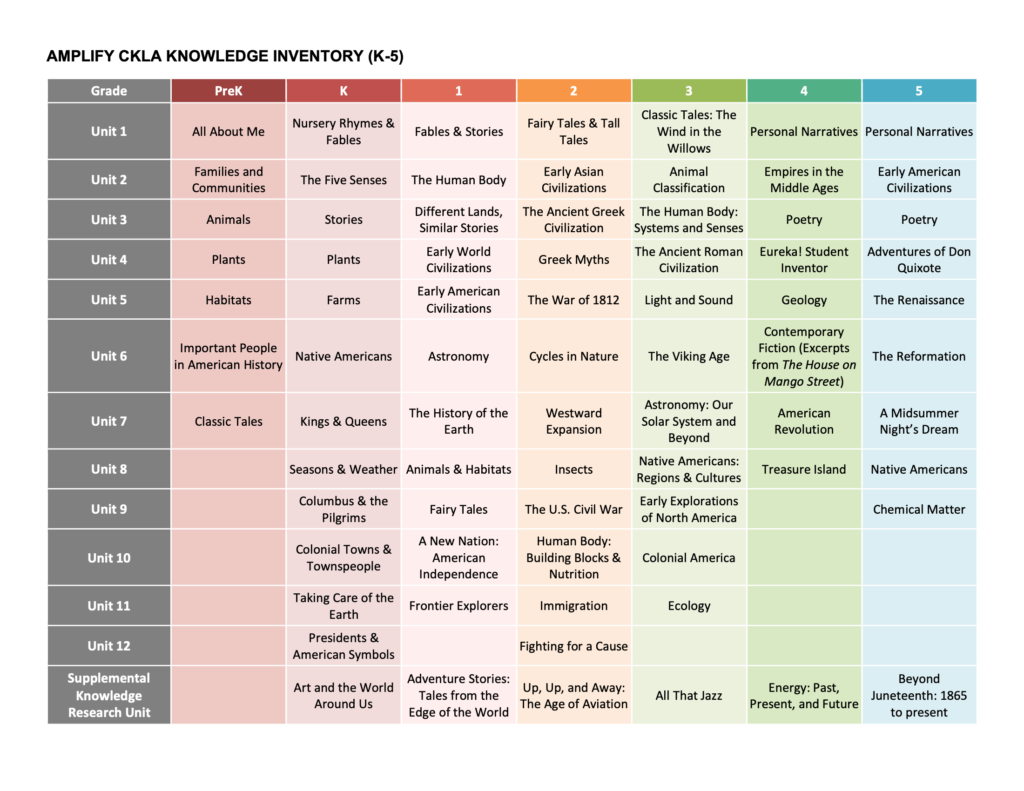Core Knowledge Language Arts/Amplify (CKLA) (K-5)
CKLA is a content-rich literacy curriculum distinguished by robust and sequential knowledge building, as well as systematic foundational skills instruction. CKLA 3–5 consists of original texts systematically and coherently ordered to build broad content knowledge in science, social studies, and the arts. An intentional approach to building knowledge invites students to engage with and make connections across topics not commonly taught in elementary literacy classrooms (e.g., Ancient Greece and the War of 1812 in grade 2). In K–2, high-interest, fully decodable stories advance along with students’ foundational reading skills.
Rich, rigorous, diverse texts:
How Core Knowledge/Amplify designs for:
Deep knowledge building
Elementary topics in history, science, literature, and the arts build on prerequisite content taught in the curriculum. For example, students examine the heart’s role in circulation and then build on that understanding in later grades when they study the circulatory system in more depth. Students learn “for keeps” through the years, gaining a firm grounding in a diverse range of topics.
Topic coherence within and across grades ensures that students both explore a diverse range of topics and go deeper into topics over the years. “Pause points” are built into all grades and provide students with time to cement or expand their learning. Lessons pay careful attention to the language students encounter in their texts. Daily writing is tightly connected to the texts and topics students explore.
Systematic foundational skills and fluency
The PreK–2 foundational reading program is thorough and well organized. Frequent assessments allow teachers to provide students with precise instruction and abundant practice. CKLA uses a collection of highly engaging decodable texts to provide practice with phonics patterns. Grade-level fluency is a feature throughout the elementary grades, supplemented with diverse short passages from various genres that are connected to topics being studied.
Equitable access to challenging texts
Topics are tightly interconnected in CKLA year-over-year as students gain knowledge to access increasingly complex texts in succeeding grades. The class works together to tackle grade-level core texts with well-organized, easy-to-access student resources. Students are empowered by what they learn about a range of topics and how they connect, fostering their confidence to persevere in their studies.
Topics of study
Learning and exhibiting deep knowledge
Foundational skills instruction
Access Core Knowledge/Amplify
CKLA was developed by the Core Knowledge Foundation, which continues to make the curriculum openly available on its website. Amplify is the distributor of CKLA and offers a digital and print version of the curriculum.
Core Knowledge/Amplify (K-5) in districts
05/22/2025
- Barbara Davidson
05/12/2025
Students in Lauren Cascio’s class break down root components of vocabulary for their Advancements in Medicine lesson
04/17/2025
Teacher Lauren Cascio transitions from Scientific Revolution lesson to Advancements in Medicine lesson
04/17/2025
Students in Lauren Cascio’s class discuss pronunciation for their Advancements in Medicine lesson
04/17/2025
“We knew students needed a strong foundation after COVID. CKLA gave us explicit, systematic instruction to address learning loss.”
04/17/2025
“They come to me almost like empty vessels. And so we pour into them in kindergarten, and then they just build on that.”
04/17/2025
“I don’t dread social studies anymore. Kids are learning about places and actually caring. The connections with ELA also has been fabulous.”
04/17/2025
“After I taught the first unit, it felt like this is great for me and great for them. They are telling me things I had hoped they would remember.”
04/16/2025
“Before the shift you always hear every year there’s this gap. I have not heard anybody talking about the gaps since we made this shift.”
04/16/2025
“We were reading Percy Jackson and able to bring some of the gods from social studies to reading … and it [was] easier for us to understand.”
04/16/2025
“It’s not just a teacher standing and reading for 20 minutes. The engagement of them owning their learning is what’s really helping it stick.”
04/16/2025
04/16/2025
07/31/2024
“Background knowledge matters. Some of our students, a three-mile radius of this school is as far as they’ll go in a year.”
04/24/2024
“Knowledge building is an equity issue.”
04/24/2024
“The things that they’re able to accomplish and learn about has blown me away.”
04/24/2024
“My non-readers are now discussing the text using the vocabulary. My whole class is able to talk about what we’re learning.”
04/24/2024
“Our kids want to come to school. They are eager to share their ideas.”
04/23/2024
“My students are so excited about learning in general. I’ve never quite had that experience until it had CKLA.”
04/23/2024
“The way everything builds on each other is far beyond what we could have done.”
04/23/2024
“Her vocabulary has jumped lightyears. I’m amazed at what they’re doing with four-year-olds.”
04/23/2024
“The exposure and the access to rigorous and diverse literature…have just really opened windows and doors for the kids in my building.”
04/23/2024
“I learned all the people from my own history. And the people in the past I didn’t even know about.”
04/23/2024
04/03/2024
02/07/2024
12/11/2023
“This was the first time that they had these novels. And the kids were so excited.”
12/08/2023
“Within the last five years, we’ve seen a tremendous jump in our students’ achievement levels with reading.”
12/07/2023
“We can’t change how students come to us, but we can control how they leave us.”
12/07/2023
“It was tough at first because of the change in structured phonics and looking at knowledge-building versus what we had been doing before.”
12/07/2023
“Your preparation looks much different, because it’s not about trying to find things and trying to look for things that fit.”
12/07/2023
“I like reading because we get to learn about the Middle Ages. So it’s like history and reading combined.”
12/07/2023
“It was a process, but it was worth it. The the actual change was that mindset when the teachers get to see the kids and the results.”
12/07/2023
“For bilingual students, they are using the same rigor that any other student is using.”
12/07/2023
“It’s amazing to see how they open up and they’re able to discuss with their partners.”
12/07/2023
“We rolled it out across the entire district. And that’s a huge bold move. But it was also exciting.”
12/07/2023
“My favorite unit in ELA was the Middle Ages. I learned a lot from it and it was a fun unit.”
12/06/2023
“Now everybody gets to collaborate, and we’re all at the same level.”
12/06/2023
“Now that we are using a high-quality instructional material, we now see that it’s very content-rich, and every one is part of the conversation.”
12/06/2023
“The kids are talking about it. You can stop them in the hallway and ask them about what they’re learning, and they will tell you.”
12/06/2023
“My daughter was on the swing telling me to push her as high as Machu Picchu. She’s in second grade.”
10/26/2023
“We had students who never saw grade level rigor ever in a day.”
10/26/2023
“You had your high group, middle group, and low group. And there was not a common body of knowledge that the students had in their classroom.”
10/26/2023
“The grade level standard is not the ceiling for some, but it needs to be the floor for everybody. All students need to sit at that grade level.”
10/26/2023
10/26/2023
“One of the students says ‘deciduous’ and uses the vocabulary word we had yesterday. I was just in shock and awe because he understood that word.”
10/25/2023
“I’m able to just build on what they already know, I’m not responsible for all of the background knowledge, because they already have it.”
10/25/2023
“I asked the kids, ‘Did they know what an ancient civilization was?’ ‘Yes, we learned about Mesopotamia in first grade.’ I was blown away.”
10/25/2023
“I’m like, ‘These are huge words how are these kids going to understand?’ But they they rise to the occasion.”
10/25/2023
“I feel like it’s really allowing them to flourish within themselves equally.”
10/25/2023
02/07/2023
“If we make a big purchase with this taxpayer money and we don’t use the materials, that is not being a good steward.”
12/02/2022
“How can we continue to support our kids during Tier 1 instruction? We’ve added some things during Tier 4 time that supports Tier 1 instruction.”
12/02/2022
“I am so excited. Every year it gets richer and deeper and thicker and more invigorating for the students and myself. We learn new things.”
12/02/2022
“I see students using vocab that they would not have used prior to being exposed to these read alouds and to these content-rich units.”
12/02/2022
“The things that the district and TNTP have given us allow us to actually teach the knowledge and the skills.”
12/01/2022
“We were not just given all of this and told to make it happen. We had leadership and training. When we go in by ourselves, we know what to do.”
12/01/2022
“We’ve had fewer and fewer students that are Tier 3 level in upper grades. We don’t have any 5th graders that are Tier 3 for reading.”
12/01/2022
“I have seen a lot of growth since the beginning of the year with my kids, especially my struggling readers.”
04/05/2022
“We have the high expectations that come naturally and we have the high expectations that have been proven through the use of HQIM.”
03/14/2022
“For me, it is all about the why, getting them the training to explain the why….then providing that support.”
03/14/2022
“Knowing all of our schools had the same curriculum, and they have all of that at their availability to use, that was very helpful.”
03/14/2022
“He grew so many levels with those readers because he felt like he could do it.”
03/14/2022
“I have never seen anything like this before. Kids going from no English to reading a reader. They feel success, they are bought into it.”
03/14/2022
“Now that I see where they are at now, I feel sad for some the kids I sent forward before. Now we are sending forward more prepared students.”
03/14/2022
“It’s not a gender-specific thing, they love all the topics.”
04/07/2020
“They are comparing and contrasting naturally…I’m not teaching a skill…they’re doing it naturally through the text.”
04/07/2020
04/07/2020
“I would’ve never taken it that way and how deeply he had to be sitting there and thinking and pondering.”
02/18/2020
“I think the change for the teachers came in that the questions were planned to start with.”
02/18/2020
“They’re [teachers] really letting the kids own the learning, really let the children engage, and let them reteach, respond, stand up.”
02/18/2020
“She had all the odds against her to not succeed in my room, and she did and I know that it’s this curriculum providing what she needed and loved.”
02/18/2020
“And I thought, ‘What a connection back to the mythology! And the continuous layering of it.'”
02/18/2020
02/18/2020
“They are so engaged in it and so involved in it. They are capable of so much more than what I thought they ever could be.”
02/05/2020
“Our planning is one curriculum—we’re analyzing work, talking about how to make it better.”
02/05/2020
11/14/2019
03/05/2018
02/04/2018
